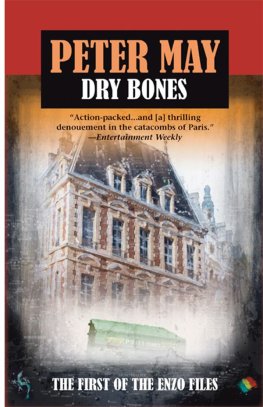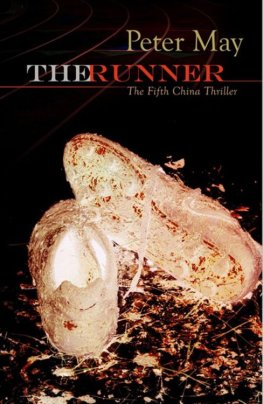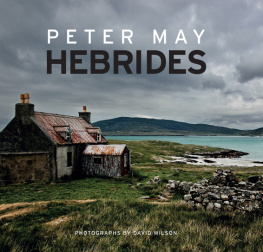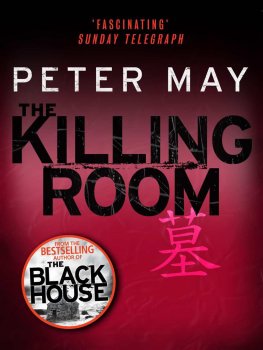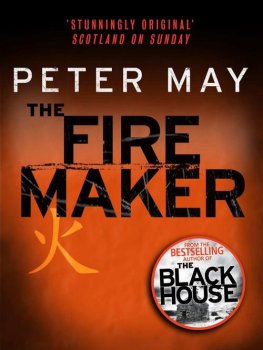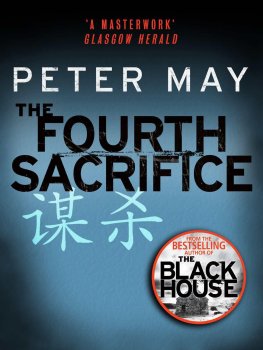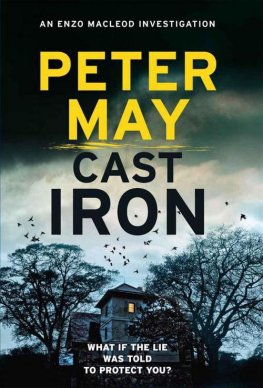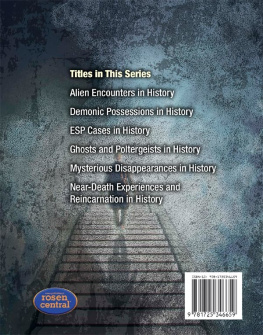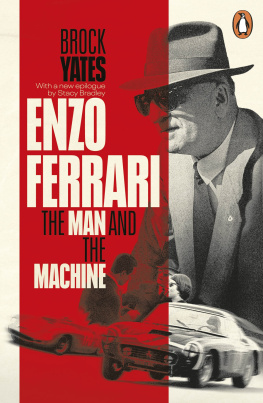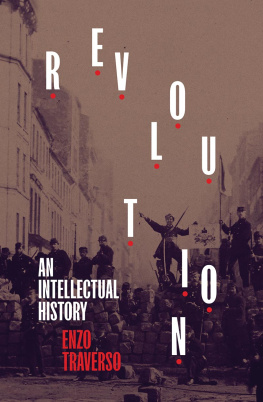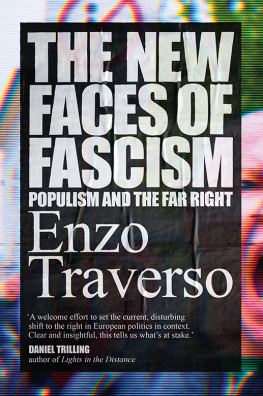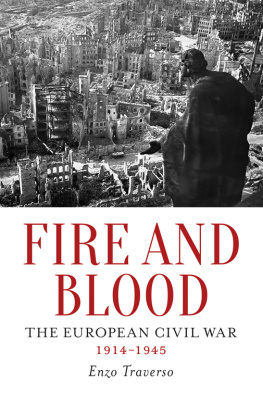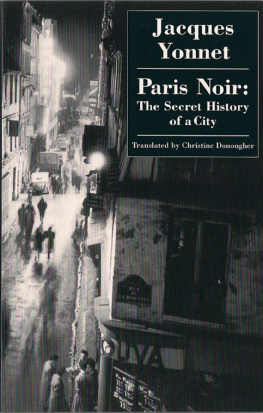Peter May
Extraordinary People
For Ariane and Gilbert
Ordinary men have to live in submission, have no right to transgress the law, because, dont you see, they are ordinary. But extraordinary men have a right to commit any crime and to transgress the law in any way, just because they are extraordinary.
Dostoevsky,
Crime and PunishmentI would like to offer my grateful thanks to some extraordinary people who gave so generously of their time and expertise during my researches for this book. In particular, Id like to express my gratitude to pathologist Steven C. Campman, M.D, Medical Examiner, San Diego, California; Mike Baxter, Head of Forensic Science Services at the Police Forensic Science Laboratory, Dundee, Scotland; Ariane Bataille and Gilbert Raffin, for the studio in St. Germain des Prs, their wonderful Paris apartment, the farmhouse in the Corrze, their endless patience, and most of all their friendship; Laurne Castelli for her insights into the byzantine workings of the mind; Jean-Pierre and Jacqueline Lelong, for the use of their home in the thirteenth; Patricia and Jean Yves Bourbonne, for allowing me access to their apartment in the Avenue Georges Mandel; Charles-Henri Montin, ENA graduate, Promotion Michel de lHpital, 1979, and civil administrator in the office of the French Prime Minister; Antoine Durrleman, Director of the cole National dAdministration (ENA); Anne-Marie Steib, Charge de la Communication, ENA; Alain Lynch, artiste extraordinaire, for his wonderful studio on the le St. Louis; Delphine Cerf, author of Les Catacombes de Paris; Barbara Peters, my editor at PPP, who brought out the best in me and made me do better; and last, but certainly not least, my wife Janice Hally, against whose IQ of 167 I had to pit my wits to crack the clues she set me for the book.
August, 1996
He finds himself in a cobbled courtyard, breath hissing back at him from buttressed walls. A rasping, gasping breath, full of fear and the certainty of death.
He knows every window by heart in this cloister of the two charnel houses. Colours embedded in the glass with affixed enamel. Le Miracle des Billettes, Elijahs Sacrifice, The Mystic Wine-press. Beloved images lost forever in the dark.
Moonlight glances off the shiny surface of cobbles worn smooth by the feet of holy men. His own feet slip and clatter as he scrambles through an alley between buttresses, heart squeezed by the hand of desperation. A green bin spins away in the darkness, spilling its decaying contents across the yard. The door ahead of him lies ajar, the corridor beyond bathed in the ghostly light of the moon, angling between tower and apse to slant through frosted glass arches. He sees a sign and a red arrow Vitraux du Clotre and turns the other way, past the sacristy.
The door to the church is open, and he is almost sucked through it into the vast, glowing stillness. The stained glass rises all around, its colours turned to black by the dead light of the nearly full moon. His panic fills the vaulted vastness with every painful breath. To his right a statue of the virgin cradling the baby Jesus watches impassively, impervious now to the prayers he has offered her so piously over so many years. The neighbouring chapel has been given over to notice-boards pasted with announcements that he will never read.
He hears the footsteps following in his wake, and breath rasping in lungs that are not his own. He flees along the north ambulatory, past the Chapel of St. Paul, the Chapel of St. Joseph and the Souls in Purgatory. At the end of the church, ninety silvered organ pipes rise in shining columns to the figure of Christ Resuscitated, flanked by two angels. He wants to scream, help me! But he knows they cannot.
He turns beneath the nine meter span of the only remaining screen in all of Paris, a delicate tracery of stone carving and spiral staircases curling around slender columns soaring into blackness, and he stops beneath Christ on the cross, a Calvary taken from the chapel of the cole Polytechnique to replace a predecessor destroyed during the Revolution. How often he has knelt here, before the altar, to receive His flesh and drink His blood.
He stops here now, and kneels again for one last time, the footsteps almost upon him. And as he rises and turns, the last thing he sees at the far end of the nave, before red turns to black, is a sign commanding him to SILENCE.
July, 2006
The Rue des Deux Ponts cuts across the centre of the le St. Louis, from the Pont Marie straddling the Seine on the north side, to the Pont de la Tournelle on the south. The island is no more than two hundred meters across and, side by side with the le de la Cit, stands at the very heart of old Paris.
Enzo had wondered how his daughter could afford an apartment here, where four square meters of real estate could cost upwards of three hundred thousand euros. But Simon had told him that she was in a tiny sixth-floor studio up in the roof of her apartment block, and that the rental was being subsidised by her employer.
The previous night in the small hours, at home in Cahors, he had questioned the wisdom of trying to see her. He had to go to Paris, anyway. The stupid wager! But in the end, it was Sophie who had made his mind up.
It had been a hot seventy degrees, humid and sticky. Somewhere across the jumble of mediaeval red-tiled roofs a clock had chimed two, a deep, sonorous ring that pealed across the centuries. The old quartier of this ancient town in southwest France dated back to Roman days, and in some of his lonelier moments here Enzo felt only a breath away from the beginnings of human history. His armchair reclined by the open window, his guitar laid across his chest, he stared at the ceiling and brushed his steel slider along the length of the fretboard, strings softly weeping, evoking the blues of a not so distant past. By leaving for Paris the next day he would miss the start of the annual Cahors Blues Festival.
Floorboards creaked in the hall. Papa?
Hed turned his head to see Sophie in her nightdress framed in the doorway, and had to blink away sudden tears, surprised sometimes by just how much he loved her. You should be sleeping, Sophie.
Go to bed, Papa. Its late, shed said softly. She always spoke English to him when they were alone. English with an oddly incongruous Scottish accent, like the sweet scent of whisky drifting in the warm air of a summers night. Shed padded across the salon and perched on the arm of his chair. Hed felt her warmth.
Come to Paris with me.
Why?
To meet your sister.
I dont have a sister, shed said. There was no rancour in it. Just a cold statement of fact, as she saw it.
Shes my daughter, Sophie.
I hate her.
How can you hate her? Youve never met her.
Because she hates you. How could I ever like anyone who hates you? She had lifted his guitar away then, and laid it against the sill, and slid down into the seat beside her father, laying her head on his chest. I love you, Papa.
* * *
He had found the apartment block quickly enough. Number 19 bis, on the west side of the street, next to Le March des les fruit and vegetable store. He had no idea what the entry code was for getting into the courtyard. He could have rung for the concierge, but what would he have told her? That his daughter lived here, on the top floor? And if the concierge had taken him up, what would he have said if Kirsty had shut the door in his face?
So he lunched in the Llot Vache bistro on the corner of the Rue St. Louis, sitting on his own in the window, watching the faces drift past, sunlight slanting down between tall old buildings that leaned at sometimes curious angles. He sat until the restaurant was empty, his waiter hovering impatiently nearby, waiting for him to pay so that he could go home for the afternoon. Finally he settled up and walked across the street to the Louis IX Bar, and found himself a table in the doorway and nursed a beer for nearly two hours. More faces passed. More time. The angle of the sun grew more acute as it slid down the sky into early evening. And still the tourists filed by, perspiring in the July heat, and private cars and taxis belched their fumes into the fibrillating air of a long Parisian summers day.

